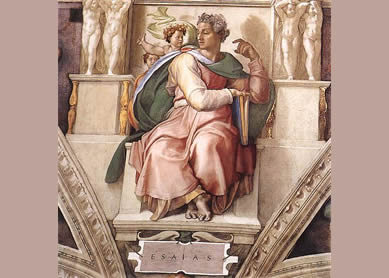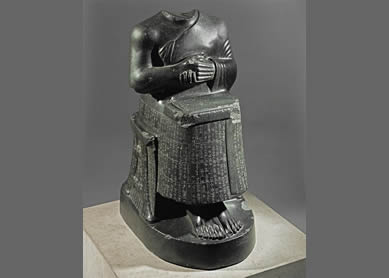Isaiah son of Amoz was a prophet during one of the most turbulent periods in Judah’s history. Early in his career, which lasted approximately 40 years (740–700 B.C.E.), the kingdom of Judah became a vassal of Assyria, a rapidly expanding power in the Levant. Around 735 B.C.E., the nations of Aram and Israel threatened to invade Jerusalem, the capital city of Judah, if King Ahaz did not join their anti-Assyrian coalition. Later, Assyria invaded Judah to suppress a rebellion by King Hezekiah in 701 B.C.E. As a prophet, Isaiah delivered messages from Yahweh about these events to political leaders and social elites in Jerusalem.
Isa 1-39 and 2Kgs 18-20 include stories about Isaiah and speeches attributed to him. Biblical scholars generally agree that some of these texts originated with the historical prophet, whereas others were edited or even composed by later writers. References to Isaiah in 2 Chronicles and in a noncanonical work called The Martyrdom and Ascension of Isaiah are almost certainly legendary.
Why does Isaiah speak of both doom and deliverance?
According to the books of Isaiah and 2 Kings, the prophet Isaiah was a well-known figure in Jerusalem, consulted by the kings of Judah. He may have been affiliated with the temple, where he received an early commissioning vision (Isa 6).
Readers have long noticed opposing tendencies within the prophecies attributed to Isaiah. In some passages, he denounces Judah’s social and religious practices and threatens Jerusalem with destruction (for example, Isa 5:1-7, Isa 29:1-4). In other passages, however, he predicts that the nation will be delivered from military threats (for example, Isa 14:25, Isa 29:5-8). These conflicting messages have produced a lively debate about the historical prophet. Did Isaiah primarily proclaim judgment or hope?
Until recently, most scholars viewed him as a prophet of doom and argued that texts depicting the deliverance of Jerusalem were written sometime in the next century, perhaps to celebrate the city’s survival of the Assyrian invasion in 701 B.C.E., before Babylon sacked the city in 587 B.C.E. A different view holds the reverse: that Isaiah mostly prophesied deliverance for his nation, like other prophets from the ancient Near East, whereas threatening texts were written in hindsight to reflect the later destruction of Jerusalem in 587 B.C.E. Still other scholars have suggested that the prophecies of judgment and salvation are both original, written by the historical prophet. Isaiah’s message may have varied, depending on which political crisis he was addressing, or the unresolved tension between these themes may have been an important part of his message.
What is Isaiah’s legacy?
Whatever one concludes about the historical prophet Isaiah, he inspired a dynamic tradition that grew over several centuries into the biblical book that bears his name. The religious and cultural influence of this book can be felt even today.
Isaiah’s prophecies are among the earliest responses to Judah’s encounter with imperial power, which would continue over several centuries. The claim that Assyria was Yahweh’s instrument for punishing Judah (Isa 10:5-15), which almost certainly goes back to Isaiah himself, shaped the portrayal of Babylon and Persia as agents of divine judgment and salvation in later biblical texts (Isa 45:1-4, Jer 25:9, Hab 1:5-11). Similarly, the book of Isaiah contains some of the first statements that Yahweh governs the entire world, not just Judah, according to an inscrutable plan (Isa 14:26-27, Isa 30:1). This belief greatly influenced later Jewish and Christian understandings of divine sovereignty. Some scholars even think that Isaiah’s view of Yahweh helped lead to the emergence of monotheism, the belief in the existence of only one god.
The book of Isaiah has been a foundational text in the history of both Judaism and Christianity. There were at least 21 copies of Isaiah among the Dead Sea Scrolls, along with six copies of commentaries on Isaiah. It is among the texts from the Hebrew Bible most frequently quoted or alluded to in the New Testament, especially in association with the birth, life, and death of Jesus (Matt 1:23, Matt 4:14, John 12:39-41). This association has continued in Christian devotional and artistic works like Handel’s Messiah.
In Judaism, more synagogue readings come from Isaiah than any other biblical book outside of the Torah, although the majority of them are from Isaiah 40-66, which was written after the time of the historical prophet. The figure of Isaiah is less prominent in Islam. He is never mentioned in the Qur’an, but he does appear in later collections of stories about prophets. Texts from Isaiah have also inspired activists from many traditions to work toward the establishment of social justice and world peace (for example, Isa 1:16-17, Isa 2:2-4, Isa 11:6-9).
Bibliography
- Berges, Ulrich F. Isaiah: The Prophet and His Book. Sheffield: Sheffield Phoenix Press, 2012.
- De Jong, Matthijs J. Isaiah among the Ancient Near Eastern Prophets: A Comparative Study of the Earliest Stages of the Isaiah Tradition and the Neo-Assyrian Prophecies. Leiden: Brill, 2007.
- Barton, John. Isaiah 1–39. Sheffield: Sheffield Academic Press, 1995.
- Stromberg, Jacob. An Introduction to the Study of Isaiah. London: T&T Clark, 2011.
- Holladay, William L. Unbound by Time: Isaiah Still Speaks. Cambridge, Mass.: Cowley, 2002.





